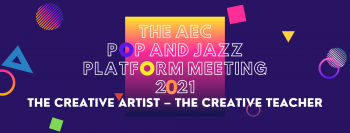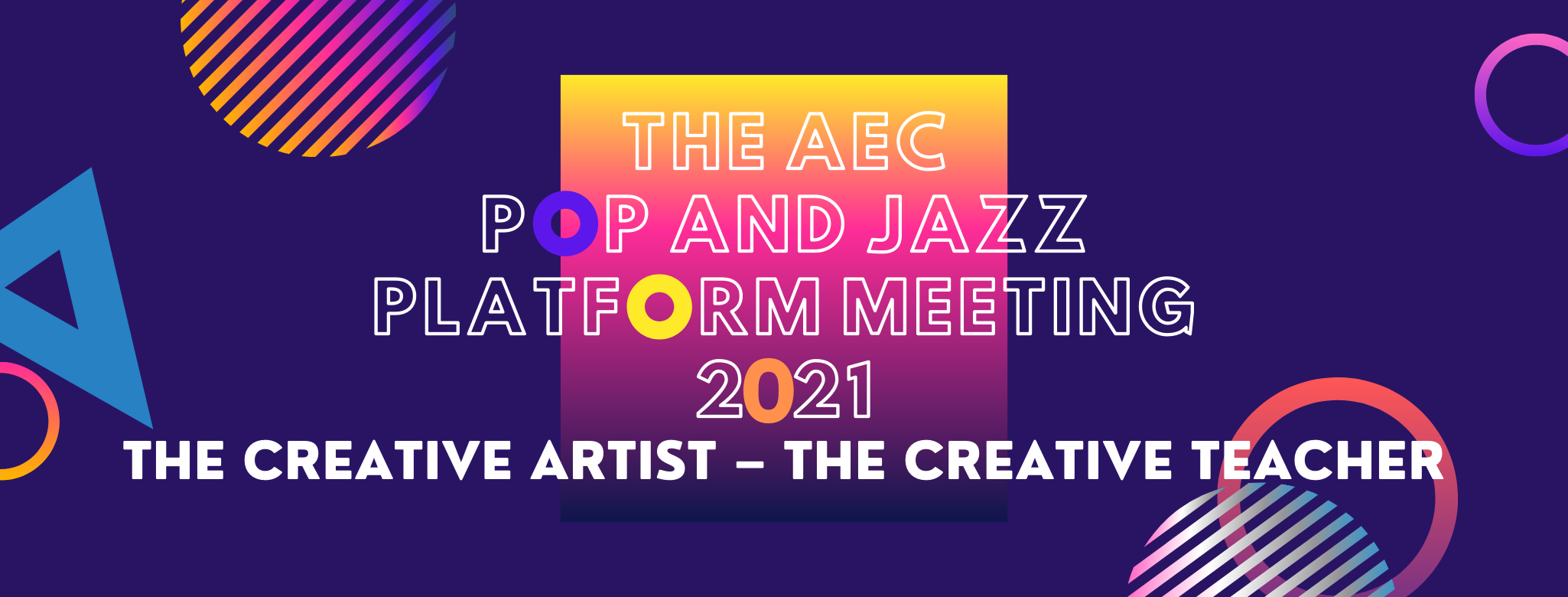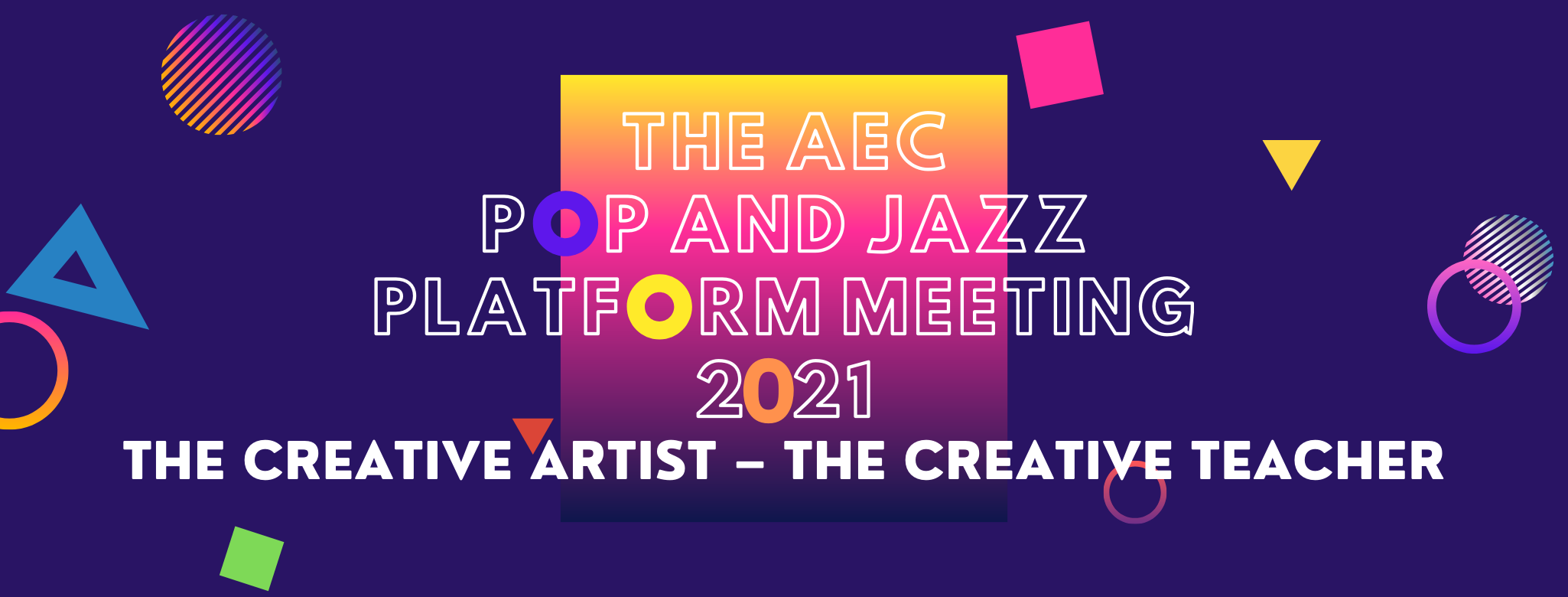- Linda Bloemhard (Codarts, Rotterdam) – Chair
- Lars Andersson (Malmoe Academy of Music, Malmo)
- Paulina Gut (AEC Office) – WG Coordinator
- Anna Uhuru (Leeds College of Music, UK)
- Udo Dahmen (Pop Akademie, Mannheim)
- Susanne Abbuehl (Royal Conservatoire The Hague)
- Jere Laukkanen (Helsinki Metropolia University of Applied Sciences)
Working Group members are financially supported by their home institutions, which cover their travel and accommodation expenses to the working group meetings and to the actual event.
Do you want to get involved, contribute or learn more?
Please visit our website or contact Paulina Gut – PJP Working Group coordinator.
The AEC PJP working group wholeheartedly invited you to join the ONLINE MEETING 2021 on Friday 12 & Saturday 13 February 2021.
Needless to say or explain that it had been a great challenge for all of us to explore new ways of doing what we love most whilst making sense of the impact of the pandemic. More than ever it seems we have had the chance to reset and evaluate some of the assumptions that have been blocking our views and perspectives. In doing so we found out what are the valuable add-ons and absolutely indispensable ways of connecting and working.
The day-to-day struggles can make it hard to dream of a future or to dare to put a new dot on the horizon. But after having seen the response to this great adversity there was much reason to believe in the spirit and resilience of all of us as human beings an in our specific field as musicians, students, educators, learners, makers, producers and performers.
Witnessing the great surge of creative collaborative diversity in finding new pathways had made it very clear that music and the arts are essential parts of our society. This is true more than ever when times get tough as they had been for a long time now.
In moving forward, the PJP WG had decided to host and design the online meeting with a lot of support from Paulina Gut and the AEC office, as well as from the volunteer guest hosts for the pre-conference sessions and the VoCon meeting. We hoped that many of you would have answered the call for topics and presentations and would have applied for the popular Open Floor sessions.
The AEC made it possible to have five participants on one ticket which means that more of you could have joined all activities during the PJP online event.
We had asked you to experiment with us in using some online digital tools of which you can find all information on the Whova app.
The four online pre-conferences on February 11, 2021 for Students, Pop, Jazz, World, Folk and Traditional Music made space for more in-depth talks about developments in the specific areas you were working in or which you would have liked to get to know better.
We had invited some wonderful guests to get the conversation going. There were meet ups in digital space and Open Floor sessions. And there was of course be MUSIC ! –
So we hope you didn’t miss the AEC PJP ONLINE meeting 2021 ! We were glad to have met you all online.
Stay healthy and safe !
Linda Bloemhard – chairwoman AEC PJP working group
Online conference,
11-13 February 2021
Programme
Thursday, 11 February
Pre Conference sessions:
10:00 – 12:30 SMS Diversity, Identity, Inclusiveness Working Group – Workshop
13:00 – 14:30 Pop session
15:00 – 16:30 Jazz session
17:00 – 18:00 World/Trad/Folk session
Friday, 12 February
11:00- 12:30 Students’ session
Conference programme
13:00 – 13:45 Welcome session with the AEC Council members and PJP WG members
13:45 – 14:00 Opening session with the PJP WG members and Stefan Gies, AEC CEO
14:00 – 15:15 In conversation with Benny Greb : Effective Practicing for Musicians, with Q&A
15:30 – 16:45 In conversation with Michael League : Roots and Re-Invention, with Q&A
Saturday, 13 February
10:00 – 11:15 In conversation with Magda Giannnikou – The Artist as a Teacher, with Q&A
11:30 – 12:30 In conversation with Melissa Aldana together with Nadine Serhalawan, Martin Fondse and Susanne Abbuehl
Lunch break
Overview of all Open Floor presentations
14:00 – 14:30 OPEN FLOOR sessions 1
14:40 – 15:10 OPEN FLOOR sessions 2
15:20 – 15:50 OPEN FLOOR sessions 3
16:00 – 16:45 Parallel sessions
1) The end of the world as we know it – Nadin Deventer, Artistic Director, Jazzfest Berlin
2) Music is about People – Johannes Geworkian Hellman (SE), Royal College of Music in Stockholm
16:45 – 17:00 Closing session with Lars Andersson, Udo Dahmen – PJP WG members and Stefan Gies, AEC CEO
Sunday, 14 February
Vocon meeting
10:00 greetings and introduction to newcomers.
10:20 welcome video performance by Frescobaldi Vocal Ensemble (Conservatorio di Musica «Girolamo Frescobaldi», Ferrara – Italy).
10:30 opening performace and greetings by Maria Pia De Vito, VoCon founder.
10:45-11:45 presentations
- Anna Koziel (Microphone Technique) 20 minutes + discussion (10 minutes)
- Cristina Zavalloni (What Am I Singing? – Back to the Core of Our Mission) 15 minutes + discussion (15 minutes)
11:45-12:00 break
12:00- 12:50 open floor session with breakout groups
All participants will be divided into three groups and each group will discuss a different topic. At the end each group will make a brief report.
12:50-13:00 planning VoCon future meetings
PJP Pre-Conference sessions
Thursday February 11, 2021
Get Whova Now
1. 10:00 – 12:30
WORKSHOP – Strenghtening Music in Society (SMS) Working Group 2 Diversity, Identity, Inclusiveness
Re-thinking and Opening Curricula within Popular, Traditional, World, Folk and Jazz music programs
Who is the student? Who is the teacher? The SMS Diversity, Identity, Inclusiveness Working Group will present its second publication “Decentering Curricula: Questions for Re-evaluating Diversity and Inclusiveness in HMEIs”, a compendium of self-reflective questions aimed to challenge the ways of thinking of curricula from a diversity perspective within Higher Music Education (HME) institutions.
What do we study? What do we teach? Diversity enriches the educational experience, and HME institutions play a critical role in this effort by strengthening the focus on promoting access and defining what is meant by quality and success when different genres and musical traditions like Popular Music, Traditional Music and Jazz coexist and influence each other in institutions. This workshop will present questions to encourage the participants to reflect on and share experiences on how to build healthy and diverse learning environments all across Europe and beyond.
Where do we study? Where do we teach? In the past months, the SMS Diversity, Identity, Inclusiveness Working Group has published a series of case studies on the SMS website, as part of its first publication “How are diverse cultures integrated in the education of musicians across Europe?”. These case studies are meant to stimulate discussion, provide new ideas and show possible pathways for institutions to take. As a working group, we feel that we can learn from the experiences of others which help challenge our own ideas and perspectives. This is also our workshop’s methodological aim.
How do we study? How do we teach? We want to discuss these common issues which are relevant to your experience teaching Popular Music, Traditional Music, Jazz and other traditions at HME institutions. In order to share these experiences, the workshop will draw on plenary and small group activities in breakout rooms.
2. 13:00 – 14:30
POP session – prepared by Susanna Mesia, Metropolia University of Applied Sciences, Helsinki, with Udo Dahmen and Anna Uhuru (PJP Working Group members)
Popular music has established itself as a competent and qualified field in higher music education in Europe. Its position in institutions and degrees varies, as in some it is the main musical style and in some it is taught alongside other musical styles. This pre-conference session invites people to discuss topics addressing issues specifically relevant to popular music education, such as curriculum, contents of courses, assessment and collaboration with music industry. The pre-conference also welcomes topics for discussion from participants. Through this online session we also aim to create new networks among teachers, students and staff in order to continue collaboration between institutions and people.
3. 15:00 – 16:30
JAZZ session – prepared by Mario Carillo, Centro Superior Música Creativa, Madrid, with Susanne Abbuehl and Lars Andersson (PJP Working Group members)
Versatility vs. specificity in higher music education:
- What are the advantages and disadvantages of genre specificity?
- Which relationships with other departments (classical, folk, pop, other) exist in our institutions, and how do we wish to develop these relationships in ways that bring added value for students and teachers as well as for the entire institution?
- How do we take into account regional factors in the programs we offer?
Life after school:
- “Employability” – how does this term relate to jazz musicians who tend to be self-employed and/or active in many different projects and areas (portfolio work)?
- How can our programs offer what is needed most to facilitate the future professional integration of our students in the best possible way?
Jazz tradition in European higher music education:
- “Who owns it?”? Under what conditions is there legitimacy in teaching jazz in Europe? What will the future bring?
- How do some European countries merge their own traditions (Flamenco, Norwegian folk music, Fado etc.) with jazz both in higher music education and in the musical scene of the country?
4. 17:00- 18:00
WORLD/TRADITIONAL/FOLK session – prepared by Maria Pomianowska, Academy of Music in Cracow, with Linda Bloemhard and Jere Laukkanen (PJP Working Group members)
Identity in the Global Village and Reconstructions – searching of a lost hierarchy of values.
Identity in the Global Village. – Music fusions – eclecticism or added value in culture.
It’s difficult to speak simply of reconstruction. This is the creation of a new tradition, a new reality. Before proceeding with the process of reconstructing performance practice, many questions arise – how to play, what to play, how to tune instruments – in order for the listeners to feel a scent of the past. This is not easy.
When we deal with professional instruments, we have a greater amount of source materials at our disposal. In the case of folk instruments, knowledge on their subject is limited.
At the very beginning of such process, a fundamental question can arise: to what extent, with exceptionally limited source materials, should this process be a reconstruction, and to what extent does it call for a creative approach? Often the entire reconstruction process of the playing method is partially restorative, and in part creating a new technique, style and repertoire.
Is it reconstruction or creating a new tradition?
What is needed and acceptable today?
Friday, February 12, 2021
11:00 – 12:30
STUDENTS meeting
– prepared by Flavio Spampinato, student at Koninklijk Conservatorium Brussel with Linda Bloemhard and Jere Laukkanen (PJP Working Group members)
THE FUTURE STUDENT
Strengthening our role at the time of online teaching&learning
Over the last months, online teaching and learning have been playing a main role in our education. We might have been start questioning our position in relation to our teachers, to our fellow students, to our education itself. We might have felt at times the need to keep our motivation high and increase personal exchanges in school. How have different European Institutions and students answered social distancing? How has the continuation of music education of high quality been ensured? What’s the impact on our future as students and, above all, how can we raise our voice in order to create better communication with department lead under these turbulent circumstances?
A close look at intensive short-term student mobility
Have you ever imagined an European network of Institutions where students would be able to move freely from one to another? We all know the Erasmus Programme – it has been a great opportunity for many of us. Now, imagine to be able to move from your own institution to another (or more!) within one academic year in the form of a short-term intensive exchange. What is your idea about that? What could make the student exchange more active and successful? Come share your voice with us!
The role of the student council.
Have we, students, seriously considered the main field of action of the student council? Each and every institution functions differently because of the difference of the scopes and the interactions between departments. Once we deeply understand the nature of the council, then we can figure out how to interface with the department lead in order to make proposal (including master classes, learning equipment, scholarships) enforce our rights, and better understand how the higher music education system works in our own country. This conference session is for all those who want to better know how to play an active role in the student life.
Information on Fee Payment
Fees AEC PJP 2021 are indicated per participating INSTITUTION.
Conference Fee package allows the institution to register up to 5 participants. If you wish to register more than 5 participants please pay the conference fee twice .
Please note that each single participant is required to register to the online event but the payment is arranged per institution.
Participation fees can be paid the following way: Ideal, Credit Card, Paypal, Bankcontact Systems Online (in the registration form)
Amount of the Registration Fee (per institution)
| Category |
ONLINE Participation
Payment and Registration BY January 20th
|
ONLINE Participation
Payment and Registration AFTER January 20th |
| Up to 5 representatives of an AEC member institution (staff and students) | 140 EUR | 180 EUR |
| Up to 5 representatives of a non-AEC member (staff and students) | 440 EUR | 480 EUR |
The participation fee will not be reimbursed for cancellations notified after February 1, 2021
Bank details for payments by bank transfer:
Bank: BNP Paribas Fortis
Account Holder: AEC-Music
IBAN: BE47 0016 8894 2980
SWIFT/BIC Code: GEBABEBB
When making the transfer, please clearly quote the code of the event (PJP 2021) and the last name of the participant
Example: PJP2021, Smith, Gotham Conservatory
To receive an invoice please email Paulina Gut at paulinagut@aec-music.eu
Open floor presentations:
1. Andy West How can higher music education engage with society?
2. Felix Schlarmann The collective as a multifunctional process, work format and artistic tool.
3. Wessel Coppes and Dr. Thomas Calkins III Select Results from the 2020 Survey of Popular Music Teaching in Europe
4. Martin Granum How to kick ass in online teaching – or how to, at least, keep the students awake…
5. Martin Fondse The creative artist – the creative teacher
6. Katrien Van Opstal The anatomy of vocal jazz: innovating vocal jazz technique
7. Ulrike Schwarz with Corinna Danzer Jump into Jazz – an interactive jazz concert with and for children
8. Bart Noorman Body & Soul – a new approach to teaching the physical aspects of our instrument when it comes to sound and creativity
9. Krystoffer Dreps „Creative Concepts “at MS Pop: Teaching music theory between holistic views and modular structures
10. Cristina Zavalloni Can Art be taught?
11. Vasco Alves Learning how to make music with d’Roda no
Ar: an artistic and pedagogical experience
11. Klemens Marktl Odd Meters in “Modern Jazz”
Pre conference sessions presentations:
1. SMS Diversity, Identity, Inclusiveness Working Group Workshop report
2. Jazz music session Presentation
3. Popular music session Jamboard results








